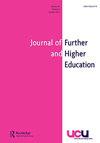Sleep disturbance, mental health, wellbeing and educational impact in UK university students: a mixed methods study
IF 2.3
Q1 EDUCATION & EDUCATIONAL RESEARCH
引用次数: 0
Abstract
ABSTRACT Sleep disturbance has harmful psychological and physical effects and due to a range of biopsychosocial and environmental factors, university students are at an increased risk. Despite the importance of this topic, it is under-researched, especially in the UK. The objectives of this study were (1) to investigate the occurrence and nature of sleep disturbance in a sample of UK undergraduate university students, (2) to compare the incidence of sleep disturbance in first- and third-year students, (3) to explore associations between sleep disturbance, daytime sleepiness, mental health and wellbeing and (4) to obtain details on how participants felt their sleep habits affected both their health and wellbeing and their education and learning. A mixed methods approach was used to collect and analyse both quantitative and qualitative data using an online survey of widely used scales (quantitative) and free text open-ended questions (qualitative). Responses were obtained from 153 undergraduate students. Quantitative findings revealed relatively high levels of disturbed sleep, daytime sleepiness, depression, anxiety and reduced wellbeing in the sample studied. Significant associations were found between all these dimensions. Qualitative findings provided insight into how students felt sleep disruption affected their health and wellbeing and their education and learning, and the serious impact this had in many cases. Insights were also obtained on strategies they used to improve sleep quality. Effective treatments for sleep problems could have beneficial effects on associated mental health and wellbeing problems and educational attainment. Student mental health services and interventions should be aware of this possibility.英国大学生的睡眠障碍、心理健康、幸福感和教育影响:一项混合方法研究
摘要睡眠障碍具有有害的心理和身体影响,由于一系列生物、心理、社会和环境因素,大学生的风险增加。尽管这一主题很重要,但它的研究却很少,尤其是在英国。这项研究的目的是(1)调查英国大学生样本中睡眠障碍的发生率和性质,(2)比较一年级和三年级学生的睡眠障碍发生率,(3)探索睡眠障碍、白天嗜睡、,心理健康和幸福感,以及(4)获得参与者认为他们的睡眠习惯如何影响他们的健康和幸福以及他们的教育和学习的详细信息。采用混合方法,通过对广泛使用的量表(定量)和自由文本开放式问题(定性)的在线调查,收集和分析定量和定性数据。从153名本科生那里获得了答复。定量研究结果显示,在所研究的样本中,睡眠紊乱、日间嗜睡、抑郁、焦虑和幸福感下降的程度相对较高。在所有这些维度之间都发现了显著的关联。定性研究结果深入了解了学生们对睡眠中断如何影响他们的健康和幸福感以及他们的教育和学习,以及在许多情况下这会产生的严重影响。他们还获得了关于改善睡眠质量的策略的见解。睡眠问题的有效治疗可能会对相关的心理健康和幸福问题以及教育程度产生有益影响。学生心理健康服务和干预措施应该意识到这种可能性。
本文章由计算机程序翻译,如有差异,请以英文原文为准。
求助全文
约1分钟内获得全文
求助全文
来源期刊

JOURNAL OF FURTHER AND HIGHER EDUCATION
EDUCATION & EDUCATIONAL RESEARCH-
CiteScore
5.20
自引率
4.30%
发文量
80
期刊介绍:
Journal of Further and Higher Education is an international, peer-reviewed journal publishing scholarly work that represents the whole field of post-16 education and training. The journal engages with a diverse range of topics within the field including management and administration, teacher education and training, curriculum, staff and institutional development, and teaching and learning strategies and processes. Through encouraging engagement with and around policy, contemporary pedagogic issues and professional concerns within different educational systems around the globe, Journal of Further and Higher Education is committed to promoting excellence by providing a forum for scholarly debate and evaluation. Articles that are accepted for publication probe and offer original insights in an accessible, succinct style, and debate and critique practice, research, theory. They offer informed perspectives on contextual and professional matters and critically examine the relationship between theory and practice across the spectrum of further and higher education.
 求助内容:
求助内容: 应助结果提醒方式:
应助结果提醒方式:


